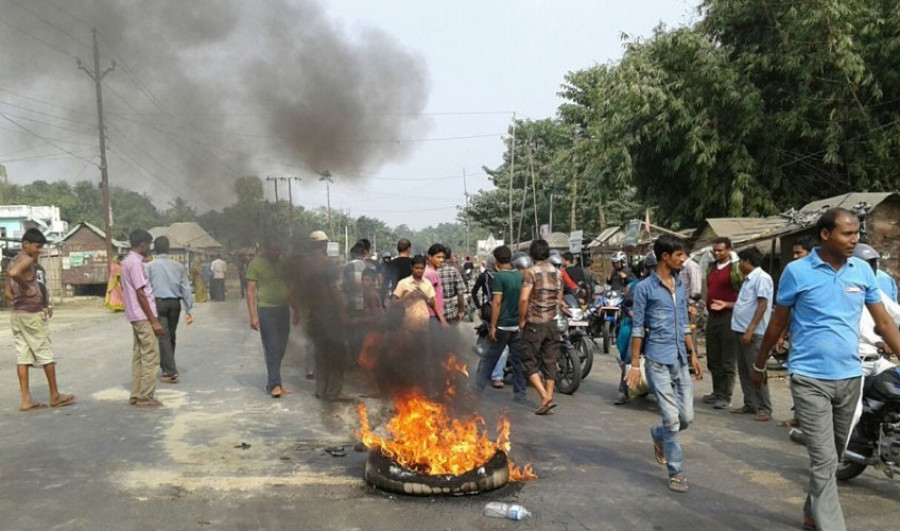Columns
Lal Commission report: Truth and lies
Shelving a report that could speak of security personnel’s wrongdoing will give rise to impunity.
Dipendra Jha
Prime Minister Pushpa Kamal Dahal’s claim on May 18 in the House of Representatives that the government was ready to make the Lal Commission report public but was constrained by the Supreme Court’s stay order is only partially true. Government bureaucrats who briefed the prime minister about the report must either have concealed the facts or misled the prime minister. Everybody, including Dahal, should know the facts about the Lal Commission report.
It was known to everybody that the state, particularly the security forces, committed atrocities against peaceful protesters and innocent civilians during the Madhes Movement launched in the run up to the 2015 constitution. After the promulgation of the constitution, Madhesi forces kept pressurising the government to form a commission to investigate all incidents that took place during the Madhes Movement. The government agreed to form a commission to investigate human rights violations during the Terai-Madhes protest against the Constitution after much ado. Then it formed the commission on September 18, 2016, under former Supreme Court justice Girish Chandra Lal. The commission submitted its report to then-Prime Minister Sher Bahadur Deuba on December 15, 2017.
The Lal Commission, which consisted of deputy attorney general Surya Koirala, advocate Sujan Lopchan, former Nepal Police AIG Navaraj Dhakal and Home Ministry joint-secretary Narayan Prasad Sharma Duwadi, addressed a total of 3,264 complaints. The commission prepared its report after visiting all the cities, including Bethari, Rangeli and Tikapur. The Nagarik Unmukti Party, whose leader Resham Chaudhary was indicted in the Tikapur incident that killed eight police personnel and one toddler, has been demanding that the Lal Commission report should be made public. Other Madhes-based parties have made similar demands.
Everybody guilty of violence must be punished, whether he/she is a citizen or a security personnel. We know that protesters were arrested for their alleged role in violence but we do not have any indictment against security personnel who brutally repressed the peaceful protesters and killed innocent people by firing bullets indiscriminately. One example of the rule of law is enough to drive home the message of justice. In the Minnesota state of the United States, police officer Derek Chauvin was held guilty last year of the on-duty murder of black man George Floyd. In the Madhes movement, security personnel brazenly violated people’s civil rights and none of them have been made accountable for their irrational and unlawful actions.
The government, which had reluctantly agreed to form the commission to probe incidents of violence that occurred during the Madhes movement, however, did not make the Lal Commission report public. Following this, the families of those victims that were killed by the police in Bethari, Rupandehi—Shashidhar Pandey, Gita Kumari Barai, Dharmendra Murau and Abdhes Kumar Kurmi registered a petition at the Office of the Prime Minister and Council of Ministers (PMO) on December 31, 2017, seeking copies of Lal Commission report under the Right to Information Act. But the PMO did not provide the report to the families of the victims. So they went to the Information Commission, demanding that the Lal Commission report be made public.
The Information Commission, too, did not act on the petition registered by the families of victims, following which the petitioners filed a writ petition at the Supreme Court on August 22, 2018. The SC issued a writ of mandamus to the Information Commission, telling it to give information about the Lal Commission report within three months. The top court told the Information Commission to take a call on whether or not the information sought by the applicants can be made public.
The SC also issued a directive order to the government to inform the public about such an important public interest issue. After the SC order, the Information Commission wrote to the PMO that there was no reason to not make public the Lal Commission report as it was a matter of public importance about which the people had the right to discuss and make an opinion about it. The Information Commission also told the government to make the report public within 60 days but on March 30, 2022, Chief Secretary Shankar Das Bairagi filed a writ petition (o78-WO-1133) at the Supreme Court against the Information Commission and Shashidhar Pandey, Gita Kumari Barai, Dharmendra Murau and Abdhes Kumar Kurmi as defendants seeking stay order against the Information Commission’s letter that directed the PMO to make the Lal Commission report public within 60 days.
This was a bizarre writ petition because people who have their fundamental rights violated by the government often file a writ petition against the government seeking remedy for those violations. This writ petition violated the writ principles, yet the single bench issued a short term stay order against the Information Commission’s decision to make the Lal Commission’s report public. This petition remains sub judice in the top court till date. The next hearing of this case has been scheduled for August 16. Of course, a third-party intervention in the case would be filed soon.
However, if the government is committed to the rule of law and wants to make the Lal Commission report public, then it can withdraw the petition filed by Chief Secretary Bairagi. It is hard to believe that Bairagi, the first bureaucrat that the prime minister consults on any administrative issues, filed the said writ petition without the prime minister’s knowledge. Dahal was not the prime minister when Bairagi filed the writ petition but since the PMO is an executive body of perpetual succession, the prime minister cannot disown the Chief Secretary’s move to file the petition in the SC seeking to keep the Lal Commission report away from the victims and the public’s eye.
A government which swears to maintain the rule of law and transparency cannot seek to keep the Lal Commission in its almirah, prohibiting the victims and the public from seeing what is contained in the document. No argument can justify such action. In a democracy, citizens, government bureaucrats, and security personnel should be accountable for their actions or omissions. The only way to make them accountable is to let the public know about their wrongdoings. If a report that may contain the security personnel’s wrongdoing is not made public, then that will only give rise to impunity. In a democracy, impunity cannot be tolerated on any pretext.




 18.12°C Kathmandu
18.12°C Kathmandu















